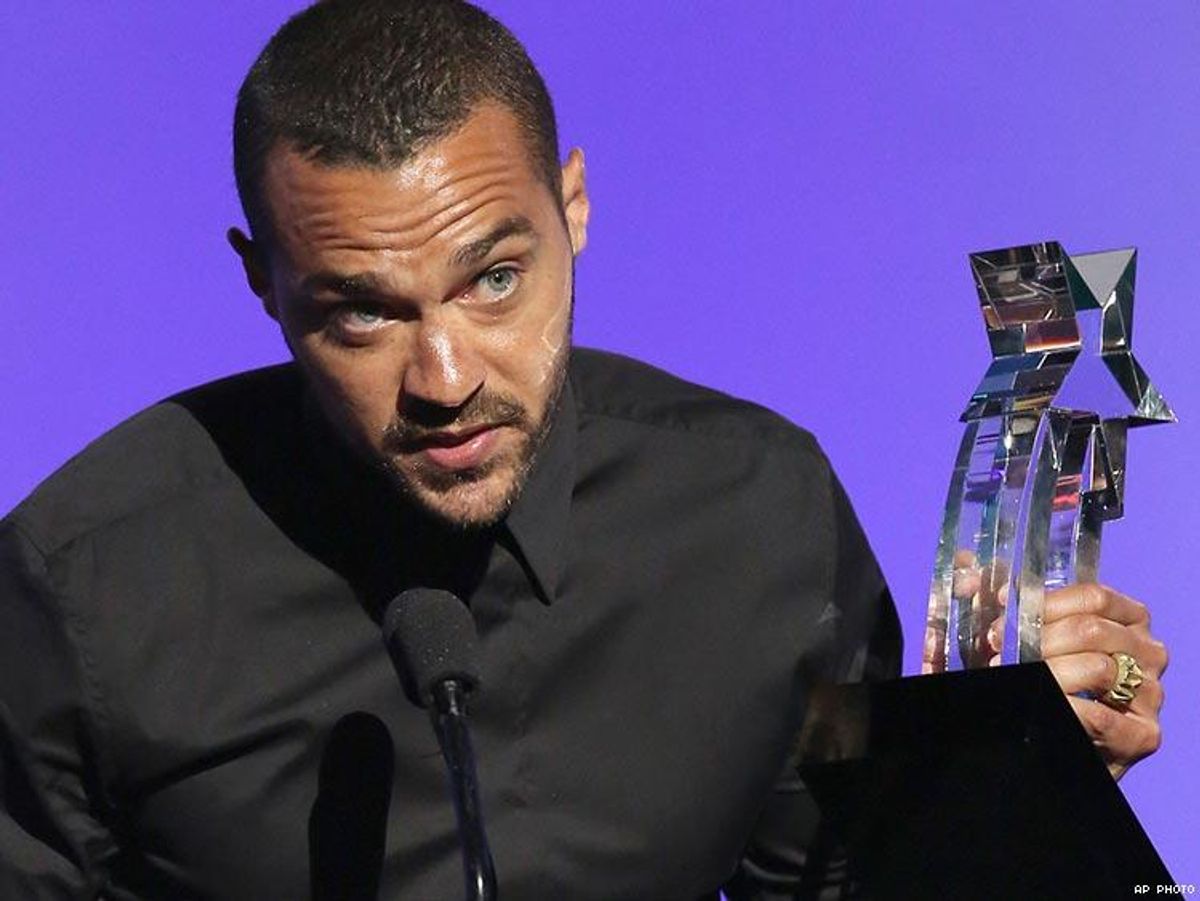Sunday night's BET Awards show was billed as a tribute to Prince, but the annual celebration of black excellence also came with a heavy dose of political reality check.
While accepting the Humanitarian Award from BET, Jesse Williams, a former teacher and activist turned actor, devoted his time onstage to discuss the state of black lives and the problems with our justice system.
And while most viewers cheered the move, some rightly pointed out that his message isn't new. According to the critics, Williams's message was better received simply because he has lighter skin and pale blue eyes. Our system puts whiteness at the top of the pyramid -- something even the actor has acknowledged before.
Williams has made headlines for more than just his role on ABCs Grey's Anatomy. Before BET honored his humanitarian efforts last week, the network aired a documentary he executively produced and starred in, called Stay Woke: The Black Lives Matter Movement.
The full speech, with annotations, is available courtesy of the Los Angeles Times. But for LGBT people who may not understand the dynamics of the black experience (or the black LGBT experience, for that matter), here are a few parallels between the struggle for civil rights and LGBT equality, to put this intersectional relationship in context.
We share a long history fighting unjust policing and state violence.
"What we've been doing is looking at the data," Williams said from the stage. "And we know that police somehow manage to de-escalate, disarm, and not kill white people every day. So what's gonna happen is we're going to have equal rights and justice in our country, or we will restructure their function and ours."
Police brutality disproportionately affects the lives of queer people and people of color. This is especially true for those in whom these identities intersect. On its website, the Black Lives Matter movement says it works to "broaden the conversation around state violence to include all of the ways in which Black people are intentionally left powerless by the state."
Any truly broad discussion of state violence will acknowledge that people classified as racial or sexual minorities are particularly vulnerable targets.
We know what's best for our own movement and fight for justice.
Williams also has a message for the critics of the movement: "Sit down."
"The burden of the brutalized is not to comfort the bystander," Williams told the cheering crowd. "That's not our job, all right? Stop with all that. If you have a critique for the resistance -- for our resistance -- then you'd better have an established record of critique of our oppression. If you have no interest in equal rights for black people, then do not make suggestions to those who do."
In other words: If you aren't fighting, quit complaining.
This message has been voiced by the queer community for decades. LGBT people have come so far only because people stood up and broke the rules. For black people, equal rights and equity in all aspects of life are still overdue. Discriminatory housing policies, imbalanced income and net worth, discrimination in mental health services -- virtually all aspects of American society are affected by race, which puts racial, sexual, and socio-economic minorities at a greater disadvantage. Such disparity calls for action, not simply discussion.
Critics of social justice movements love to attack their choice of tactics. Whether it's shutting down a freeway, interrupting a White House Pride event, or commandeering the microphone from a candidate at a rally, black and LGBT activists alike have had to contend with those who insist that they should be patient and respectful above all else -- an act that activist circles recognize as tone policing. And Williams wasn't having that, either.
But one point in particular got everyone's attention and put a certain celebrity in the hot seat: that cultural appropriation is dangerous.
"We've been floating this country on credit for centuries, yo. And we're done watching and waiting while this invention called whiteness uses and abuses us, burying black people out of sight and out of mind while extracting our culture, our dollars, our entertainment, like oil, black gold. Ghettoizing and demeaning our creations, then stealing them, gentrifying our genius, and then trying us on like costumes before discarding our bodies like rinds of strange fruit," says Williams, paying homage to the Billie Holiday song about lynching.
Cultural appropriation has become a hot topic recently, whether in relation to white appropriation of blackness, black American appropriation of African cultures, or nonqueer appropriation of queer culture (that is to say, the appropriation of black trans culture -- e.g. "YAS Queen!").
Justin Timberlake's tweet critiquing Williams's speech caught him so much flak because people see him as a part of a perpetual problem, even if he may not intend to be.
The Big Picture
Here's the takeaway: If we fight for the equality of LGBT lives, we have to fight for the equality of all lives -- including black lives. These identities are not exclusive, and the forces that oppress them are largely the same.
Which raises the question: Why didn't we listen when we heard this for the first time? Why did the world wait to hear the message until it came from one of black America's fairest and bluest-eyed freedom fighters, even though shade shouldn't matter?
Perhaps it's time we start listening to a greater chorus of voices -- not just those that emanate from bodies that fit into narrow, Eurocentric standard of beauty. With that said, Williams's message and call to action had something for all of us, no matter what labels you wear.

















































































